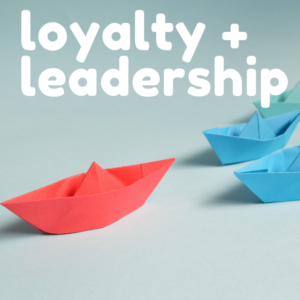 I recently reread a great piece about loyalty by David Brooks of the New York Times comparing two philosophers, William James, and Josiah Royce. You may not have heard of Josiah Royce? He believed that to have a functioning society, we need unity, not division, and above all, we need loyalty to one another.
I recently reread a great piece about loyalty by David Brooks of the New York Times comparing two philosophers, William James, and Josiah Royce. You may not have heard of Josiah Royce? He believed that to have a functioning society, we need unity, not division, and above all, we need loyalty to one another.
What good leaders know is that if they want loyalty from their teams, they need to go first. They need to show loyalty – authentically – to those who would follow them. It’s a mutual exchange, not a one-way street. Leaders who demand, but don’t return loyalty, will get it to their face and behind their backs will be all those behaviors that we deplore like backstabbing, duplicitousness, and deceit. Lack of coherence in a leader – “do what I say, not what I do” – creates this type of break-in behavior within a group. These are fractured cultures – unintentional cultures that do not produce results for anyone.
Leaders who show loyalty are explicit in what they expect, showing people how they can be successful, what loyalty looks like, and the behaviors that are associated with it. Leaders who demand loyalty and don’t return it generally show their narcissism – I am the leader, therefore, you must follow – believing that title alone gives them the power. Let me be clear, no one earns the right to loyalty simply by being elevated into a leadership role. Some leaders confuse compliance with loyalty, but they are very, very different. Think about all those federal government workers who were forced to work without pay because their positions were deemed “essential.” In most cases, it wasn’t because of loyalty to the president and his agenda that they showed up every day. They were loyal to their jobs, their teams, and in almost all cases, needed the pay from their job to survive.
Good leaders model loyalty. When an employee or team member makes a mistake, it’s not fatal, it’s a learning opportunity and patience is practiced. Standards are upheld and those who choose not to meet them will eventually be let go because the leader is loyal to the mission, the vision, and the team and will not tolerate those who try to undermine or ignore it. Loyalty looks like talking through differences rather than making people wrong. It means looking for the good in all people, not just those we agree with. Loyalty looks like people knowing they have Trust, Compassion, Stability, and Hope in the workplace (from the Gallup Strengthsfinders Polling).
Loyalty is not blind, trust but verify. Good leaders don’t make people “earn” loyalty. Just like trust, they give it and then check to make sure it is warranted. How loyal do you think your team is to you as the leader? More importantly, how loyal are you to the team?
